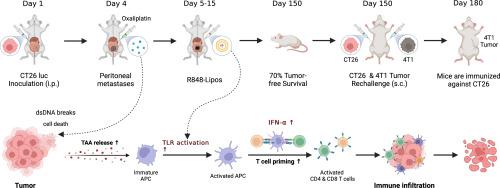当前位置:
X-MOL 学术
›
J. Control. Release
›
论文详情
Our official English website, www.x-mol.net, welcomes your feedback! (Note: you will need to create a separate account there.)
Resiquimod-loaded cationic liposomes cure mice with peritoneal carcinomatosis and induce specific anti-tumor immunity
Journal of Controlled Release ( IF 10.5 ) Pub Date : 2024-06-25 , DOI: 10.1016/j.jconrel.2024.06.041 Po-Han Chao 1 , Vanessa Chan 1 , Jiamin Wu 1 , Lucas J Andrew 2 , Shyh-Dar Li 1
Journal of Controlled Release ( IF 10.5 ) Pub Date : 2024-06-25 , DOI: 10.1016/j.jconrel.2024.06.041 Po-Han Chao 1 , Vanessa Chan 1 , Jiamin Wu 1 , Lucas J Andrew 2 , Shyh-Dar Li 1
Affiliation

|
Peritoneal carcinomatosis (PC) is characterized by a high recurrence rate and mortality following cytoreductive surgery and hyperthermic intraperitoneal chemotherapy (HIPEC), primarily due to incomplete cancer elimination. To enhance the standard of care for PC, we developed two cationic liposomal formulations aimed at localizing a toll-like receptor agonist, resiquimod (R848), in the peritoneal cavity to activate the immune system locally to specifically eradicate residual tumor cells. These formulations effectively extended R848 retention in the peritoneum by >10-fold, resulting in up to a 2-fold increase in interferon α (IFN-α) induction in the peritoneal fluid, without increasing the plasma levels. In a CT26 colon cancer model with peritoneal metastases, these liposomal R848 formulations, when combined with oxaliplatin (OXA)—an agent used in HIPEC that induces immunogenic cell death—increased tumor infiltration of effector immune cells, including DCs, CD4, and CD8 T cells. This led to the complete elimination of PC in 60–70% of the mice, while the control mice reached humane endpoints by 30 days. The cured mice developed specific antitumor immunity, as re-challenging them with the same tumor cells did not result in tumor establishment. However, inoculation with a different tumor line led to tumor development. Additionally, exposing CT26 tumor antigens to the splenocytes isolated from the cured mice induced the expansion of CD4 and CD8 T cells and the release of IFN-γ, demonstrating long-term immune memory to the specific tumor. The anti-tumor efficacy of these liposomal R848 formulations was mediated via CD8 T cells with different levels of involvement of CD4 and B cells, and the combination with an anti-PD-1 antibody achieved a cure rate of 90%.
中文翻译:

负载瑞西莫德的阳离子脂质体治愈腹膜癌小鼠并诱导特异性抗肿瘤免疫
腹膜癌病(PC)的特点是细胞减灭术和腹腔热灌注化疗(HIPEC)后的高复发率和死亡率,这主要是由于癌症消除不完全所致。为了提高 PC 的护理标准,我们开发了两种阳离子脂质体制剂,旨在将 Toll 样受体激动剂瑞西莫德 (R848) 定位在腹膜腔中,以局部激活免疫系统,特异性消灭残留的肿瘤细胞。这些制剂有效地将 R848 在腹膜中的滞留时间延长了 10 倍以上,从而使腹膜液中干扰素 α (IFN-α) 的诱导增加高达 2 倍,而不会增加血浆水平。在腹膜转移的 CT26 结肠癌模型中,这些脂质体 R848 制剂与奥沙利铂 (OXA)(一种用于 HIPEC 的药物,可诱导免疫原性细胞死亡)联合使用,可增加效应免疫细胞(包括 DC、CD4 和 CD8 T)的肿瘤浸润细胞。这导致 60-70% 的小鼠完全消除了 PC,而对照小鼠则在 30 天时达到了人道终点。治愈的小鼠产生了特异性的抗肿瘤免疫力,因为用相同的肿瘤细胞重新攻击它们并没有导致肿瘤的形成。然而,接种不同的肿瘤系会导致肿瘤的发展。此外,将CT26肿瘤抗原暴露于从治愈小鼠身上分离的脾细胞中,诱导CD4和CD8 T细胞的扩增以及IFN-γ的释放,证明了对特定肿瘤的长期免疫记忆。这些脂质体R848制剂的抗肿瘤功效是通过CD8 T细胞以及不同程度的CD4和B细胞参与介导的,与抗PD-1抗体组合实现了90%的治愈率。
更新日期:2024-06-25
中文翻译:

负载瑞西莫德的阳离子脂质体治愈腹膜癌小鼠并诱导特异性抗肿瘤免疫
腹膜癌病(PC)的特点是细胞减灭术和腹腔热灌注化疗(HIPEC)后的高复发率和死亡率,这主要是由于癌症消除不完全所致。为了提高 PC 的护理标准,我们开发了两种阳离子脂质体制剂,旨在将 Toll 样受体激动剂瑞西莫德 (R848) 定位在腹膜腔中,以局部激活免疫系统,特异性消灭残留的肿瘤细胞。这些制剂有效地将 R848 在腹膜中的滞留时间延长了 10 倍以上,从而使腹膜液中干扰素 α (IFN-α) 的诱导增加高达 2 倍,而不会增加血浆水平。在腹膜转移的 CT26 结肠癌模型中,这些脂质体 R848 制剂与奥沙利铂 (OXA)(一种用于 HIPEC 的药物,可诱导免疫原性细胞死亡)联合使用,可增加效应免疫细胞(包括 DC、CD4 和 CD8 T)的肿瘤浸润细胞。这导致 60-70% 的小鼠完全消除了 PC,而对照小鼠则在 30 天时达到了人道终点。治愈的小鼠产生了特异性的抗肿瘤免疫力,因为用相同的肿瘤细胞重新攻击它们并没有导致肿瘤的形成。然而,接种不同的肿瘤系会导致肿瘤的发展。此外,将CT26肿瘤抗原暴露于从治愈小鼠身上分离的脾细胞中,诱导CD4和CD8 T细胞的扩增以及IFN-γ的释放,证明了对特定肿瘤的长期免疫记忆。这些脂质体R848制剂的抗肿瘤功效是通过CD8 T细胞以及不同程度的CD4和B细胞参与介导的,与抗PD-1抗体组合实现了90%的治愈率。
















































 京公网安备 11010802027423号
京公网安备 11010802027423号